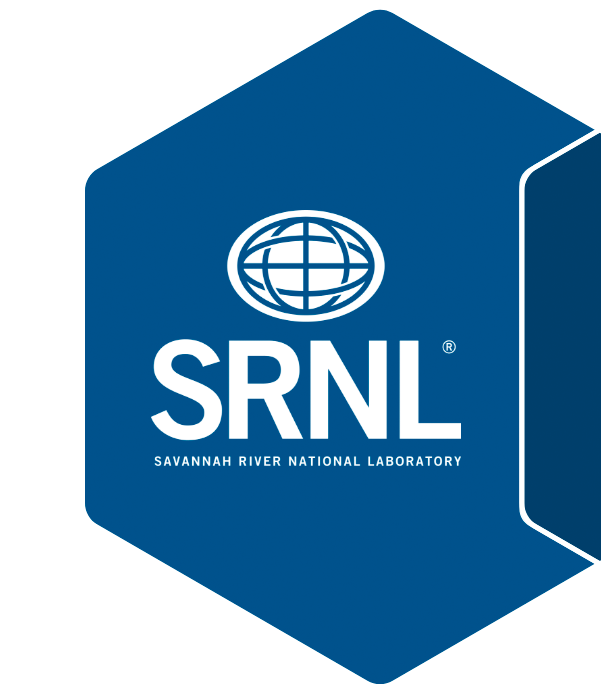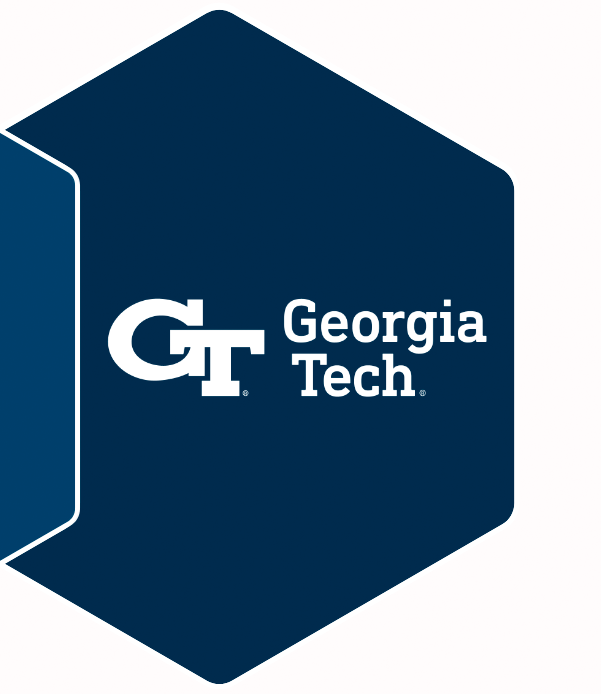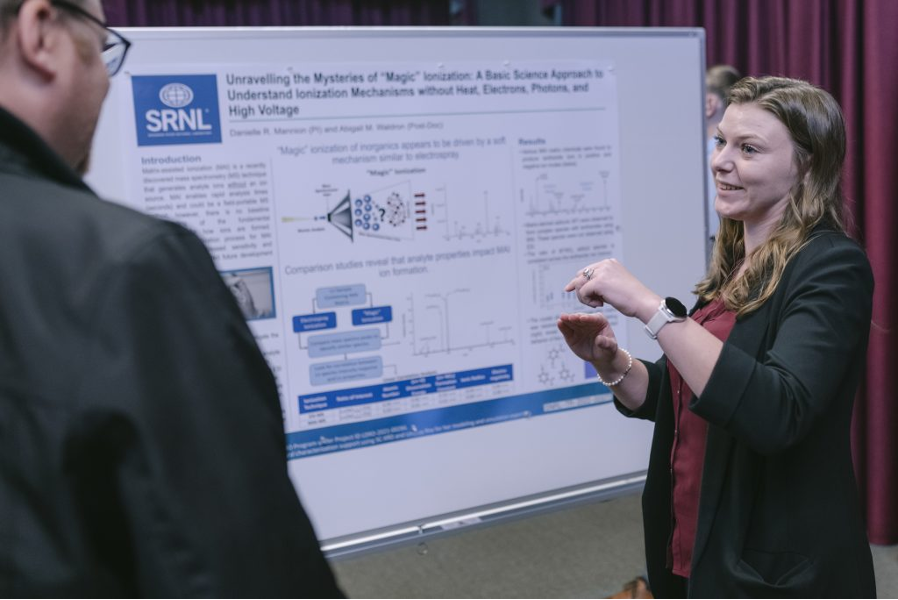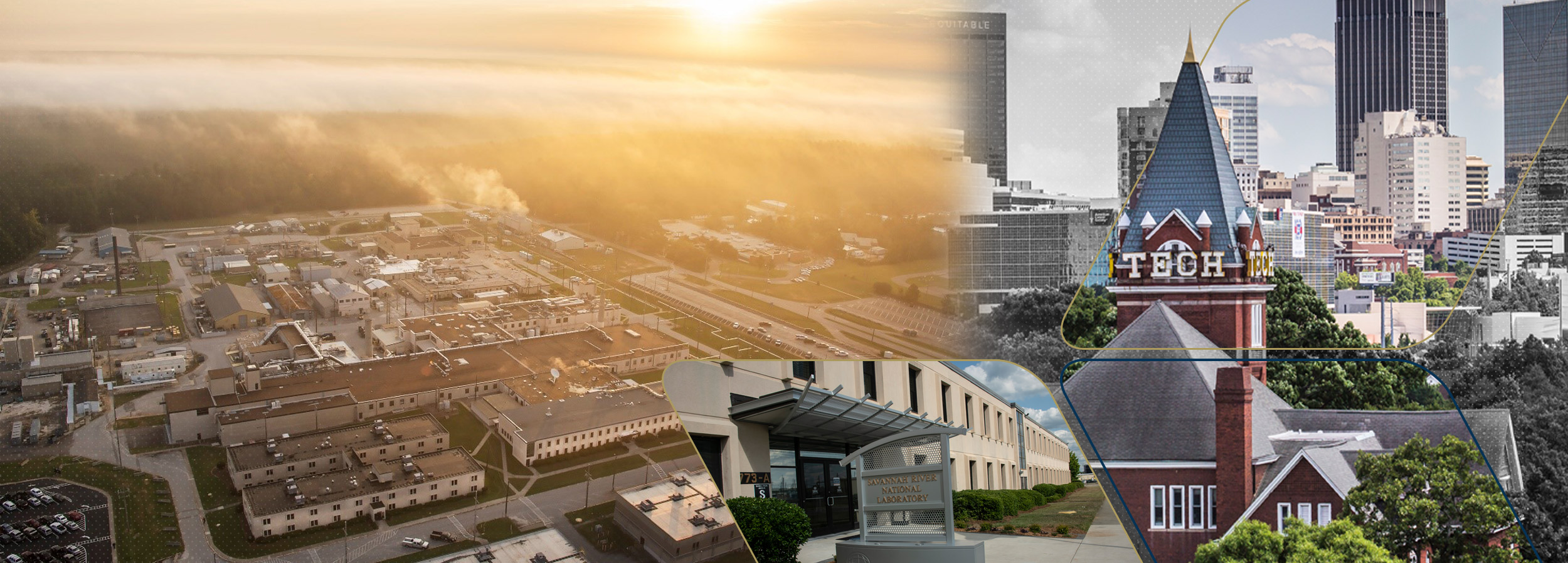Savannah River National Laboratory
Savannah River National Laboratory (SRNL) is the U.S. Department of Energy’s applied research and development national laboratory for environmental and national security missions. Located in Aiken, South Carolina, SRNL delivers solutions for nuclear materials management, clean energy development, and global security.
SRNL transforms mission-critical science into action — bridging research, engineering, and operational excellence to support DOE’s Office of Environmental Management, the National Nuclear Security Administration (NNSA), and other federal partners.
Research projects led by SRNL scientists and engineers create real-world collaboration opportunities with Georgia Tech across nuclear science, robotics, artificial intelligence, materials research, and national security — supported by internship programs, post-doctoral positions, and joint faculty appointments.
View Georgia Tech’s new data dashboard which includes key contributions, milestones, and the significant impact of its expanding partnership with Savannah River National Laboratory.
Partnership Intersection
Together, Georgia Tech and SRNL are advancing solutions in key scientific and technological fields, including:
- Separation Science – Developing advanced chemical processes for environmental and industrial applications.
- Radiochemistry & Actinide Science – Advancing nuclear materials research for energy and security.
- Advanced Manufacturing – Pioneering new materials and production techniques.
- Cybersecurity – Strengthening the protection of critical infrastructure.
- Nonproliferation – Enhancing global security through nuclear safeguards and threat reduction.
- Hydrogen & Tritium Processing – Driving innovation in clean energy and national defense applications.
With over 1,000 employees and collaborations spanning universities, government agencies, and industry, SRNL is committed to developing the next generation of scientific leaders.
- Advancing safe, secure handling of legacy nuclear materials
- Strengthening U.S. leadership in hydrogen production and infrastructure
- Enhancing tools for radiation detection, emergency response, and threat mitigation
- Supporting environmental cleanup technologies and long-term waste management

Savannah River National Laboratory
- SRNL is the nation’s leading research and development center for the Department of Energy’s Office of Environmental Management and Office of Legacy Management.
- SRNL continues to serve a critical role for the National Nuclear Security Administration (NNSA) in both weapons and nonproliferation programs.
- SRNL provides integrated technical solutions that are both modern and practical to address complex technical challenges of environmental cleanup and national security programs mission needs.
- On a day-to-day basis, SRNL works with faculty members and students on cooperative projects across a wide spectrum of scientific inquiry. Partnering agreements, such as Memorandums of Agreement, Strategic Partnership Projects, Cooperative Research and Development Agreements or other mechanisms, enable collaboration.

Georgia Institute of Technology
- Georgia Tech's engineering and computing Colleges are the largest and among the highest-ranked in the nation. The Institute also offers outstanding programs in business, design, liberal arts, and sciences.
- With more than $1 billion annually in research awards across all six Colleges and the Georgia Tech Research Institute (GTRI), Georgia Tech is among the nation’s most research-intensive universities. It is an engine of economic development for the state of Georgia, the Southeast, and the nation.
- Georgia Tech’s mission is to develop leaders who advance technology and improve the human condition. Its mission and strategic plan are focused on making a positive impact in the lives of people everywhere.
- For more than 135 years, the people of Georgia Tech have dared to imagine and then create solutions for a better future. The innovative culture and leadership continue, for Progress and Service for all.
Research Opportunities Include:
- Applying chemical processing and characterization skills to protect the environment and further national needs and global security
- Protecting the environment and further national security processes by developing innovative technologies to treat and safely store nuclear waste
- Identifying novel approaches to maintain aging infrastructure exposed to extreme conditions
- Developing models and solutions to remediate soil and groundwater
- Forging solutions that enable global security and stability
- Leveraging transformative technologies to address emerging challenges
- Designing engineering solutions that enable global energy and economic security and stability
Joint Appointments
SRNL offers joint appointments to faculty and staff who are actively collaborating with SRNL research staff. The appointment is a recognition of individuals who are consistently engaged with SRNL in meaningful collaborations.
A joint appointment can further the collaborative experience between faculty and SRNL staff, spurring additional collaborative opportunities. Collaborative opportunities include, but are not limited to, development of joint proposals, publication of peer-reviewed journal articles, and engagement with students in the laboratory environment.

At the establishment of a joint appointment, the collaborative scope is identified along with technical and management points of contact at the laboratory.
Joint appointments are renewed upon demonstration of continued meaningful collaboration with SRNL staff to further the mission needs of the Department of Energy.
For more information on joint appointments and other collaborative opportunities at SRNL, please email ResearchInnovations@SRNL.doe.gov.
Student/Postdoc Opportunities
SRNL offers internships and research fellowships tailored to university programs and federal research initiatives. Georgia Tech undergraduate and graduate students can participate in hands-on research in national security, environmental stewardship, and advanced science & technology. These programs provide invaluable experience working alongside leading experts in their fields.
- Internships funded through targeted proposal awards & federal research programs
- Opportunities in cutting-edge research aligned with SRNL’s core competencies
- A direct pathway for top talent into careers in science, engineering, and national security.
Undergraduate Internships
Internship positions are available for undergraduate students to explore career options and experience a learning environment at a national laboratory. Supplemental opportunities to develop students along their educational path are available including education on resume writing, technical reference identification, scientific publication process, and science communication.
Specific opportunities include the Office of Science Workforce Development for Teachers and Scientists (WDTS) Science Undergraduate Laboratory Internship (SULI) program. SRNL welcomes candidates from Georgia Tech to apply through the Office of Science application system.
Graduate Internships
Graduate student internship opportunities aligned with graduate student research may be supported. SRNL encourages advisors and graduate students to work with SRNL research staff to identify opportunities to leverage the unique capabilities and instrumentation of SRNL to further academic research. Opportunities may coincide with the academic calendar and be based on individual project needs.
Specific opportunities include the Office of Science Workforce Development for Teachers and Scientists (WDTS) Graduate Student Research (SCGSR) program.
Postdoctoral Researchers
As a sustaining member of the National Postdoctoral Association, SRNL fosters postdoctoral researchers to develop their technical skillsets. SRNL provides postdoctoral researchers an exciting learning environment to develop into the next generation of professional scientists and engineers, explore basic science and the unknown, and make impactful discoveries. Postdoctoral researchers work alongside experienced research staff, applying exceptional critical thinking and data-analysis skills to develop advanced scientific ideas.
Applicants must be capable of assessing technical challenges and developing thoughtful, creative solutions. Effectively communicating technical results, as well as demonstrating the potential to generate new ideas and convert them into future programs, is vital to success at a national laboratory.
Postdoctoral research positions are appointed annually, with the majority of individuals enrolled in the program for a two-year period. The option to renew up to a total of three years is available. Publication of impactful research efforts is encouraged and expected.
Distinguished and named postdoctoral research fellow positions are available.








